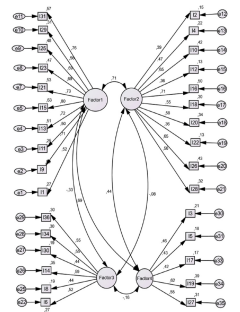Aim: The aim of this study was to examine the validity and reliability of the ‘Chedoke-McMaster Attitudes Towards Children with Handicaps’ scale in Turkey.
Method: A methodological study design was chosen. The data was collected in a primary and secondary school under Antalya Muratpaşa District’s National Education Directorate. Schools with inclusive classes open to children with special educational needs were chosen using a random sampling method. Four hundred students in primary and secondary education between the ages of 9 and 13 were included in the study. Research data was collected from the chosen schools during the 2016-2017 spring semester. The Child’s Descriptive Information Form and Chedoke-McMaster Attitudes Towards Children with Handicaps scale were used to collect data. Language and content validity, construct validity, internal consistency, and reliability analyzes were performed.
Results: It was determined that children who have a family member with disabilities had higher scores. The confirmatory factor analysis revealed that the Kaiser-Meyer-Olkin values were 0.90 and the chi-square value for the Barlett sphericity test was highly significant. The scale was reorganized into a four-factor structure featuring the following subscales: Interaction and Acceptance, Avoidance, Pity, and Sense of Affinity. The results of the analyzes confirm the new structure. The Cronbach’s alpha value was 0.85.
Conclusion: The Chedoke-McMaster Attitudes Towards Children with Handicaps scale was found to be compatible with Turkish culture. The scale’s new factors also reflect general attitudes existing within Turkish culture towards people with disabilities that require change.
Cite this article as: Çiçek-Gümüş, E., Öncel, S. (2020). Validity and reliability of the Chedoke-McMaster Attitudes Towards Children with Handicaps Scale in Turkey: A methodological study. Florence Nightingale Journal of Nursing, 28(1), 1-12.




.png)
.png)
